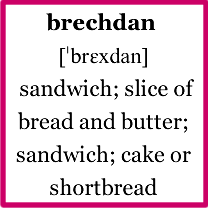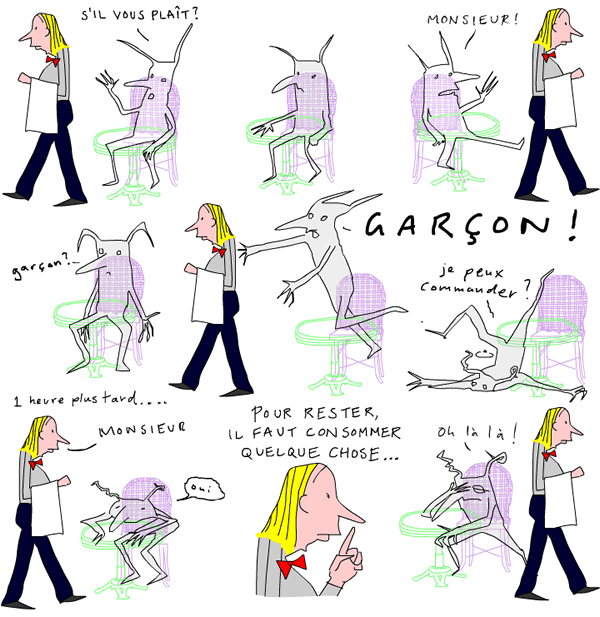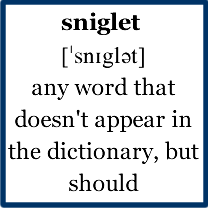
Here’s a recording in a mystery language.
Can you identify the language, and do you know where it’s spoken?

Here’s a recording in a mystery language.
Can you identify the language, and do you know where it’s spoken?

The Welsh word for sandwich is brechdan [ˈbrɛxdan], which comes from the Irish word brechtán (butter, fat), according to the Geiriadur Prifysgol Cymru.
However according to MacBain’s Dictionary, is related to the Scottish Gaelic word for pancake, breacag, which is related to breachdan (custard), which comes from the Middle Irish breachtán (a roll), which is related to the Welsh words brithog (mottled, variegated, multi-coloured, speckled, fine) and brith (marked with different colours, variegated, coloured, chequered, mottled, pied, spotted, speckled, brindled, grey), which are related to the word word breac (speckled) in Irish and Scottish Gaelic.
According to the Geiriadur Prifysgol Cymru, brechdan is a sandwich, and also a slice of bread and butter; sandwich; cake or shortbread.
There are also a number of interesting types of sandwich in Welsh:
– brechdan fawd / gorddi = slice of bread on which butter is spread with the thumb
– brechdan gaerog / ddwbl / linsi / fetal / deiliwr = an oatcake on a slice of buttered white bread or between two slices of white bread
– brechdan grasu = toast, toasted sandwich
– brechdan i aros pryd = slice of bread and butter to carry on with until the next meal, snack
– brechdan doddion = slice of bread spread with dripping
– brechdan driagl / driog = slice of bread spread with treacle
For details of the origins of the word sandwich, see Sandwiches and Portsmouths
| français | English | Cymraeg |
|---|---|---|
| les dentier | dentures | dannedd gosod |
| le chantier | building site | safle adeiladu |
| la dictature | dictatorship | unbennaeth; awtocratiaeth; teyrnlywodraeth |
| le dictateur | dictator | unben; teyrn |
| l’autocratie | absolute dictatorship | unbennaeth |
| une quinzaine; quine jours; deux semaines | fortnight | pythefnos |
| le dent de sagesse, le gros dent | wisdom tooth | cilddant olaf, cefnddant |
| poser sa candidature pour | to apply for (a job) | cynnig, ymgeisio, ymgynnig, gwneud cais |
| dépliant | leaflet | taflen; dalen |
| la disquette | floppy disk | disg llipa |
| déblie; allumé | geek, nerd | llipryn, gwlanen, brechdan |
| le monument classifié | listed builing | adeilad cofrestredig |
| le conseil d’administration | board (of directors) | bwrdd (cyfarwyddwyr) |
| l’affairiste; le magouiller | wheeler dealer | sgemiwr a sgiliwr |
| magouiller | to wheel and deal | sgemio a sgilio |
| mettre son nez partout | to have a finger in every pie | bod gan fys ym mhob brŵes/cawl |
| se mêler partout | to have a finger in many pies | bod gan fys ym mhob brŵes/cawl |
I learnt an interesting word today – retronym – a new name for something that already existings that distinguishes the original from a more recent version. For example, ebooks are becoming increasingly popular, so there’s a need for a new word for non-ebooks. On the program I heard the word retronym, Word of Mouth, they suggested pbooks, paper books or printed books for the non-electronic version. Do you have any other suggestions?
They also discussed phones – since the default phone for most people these days is a mobile/cell phone, there’s a need to a different word for a non-mobile phone. Home phone or landline were suggested. Do you have other words?
For more information about retronyms, see: https://en.wikipedia.org/wiki/Retronym and https://en.wikipedia.org/wiki/List_of_retronyms
When you’re in a restaurant or café, how do you get the attention of a waiter/waitress?
This cartoon shows how it can be difficult in France.

The customer in the cartoon first says “Please”, then “Sir/Mr”, then “Waiter”, then ‘Can I order?’, then a hour later the waiter finally speaks to him and says, “Sir, to stay here you must have something to eat or drink.”
What’s it like where you are? Are waiting staff in restaurants quick to respond to you, or do they go to great lengths to ignore you? What do you call waiting staff?
I’ve worked as a waiter and as a barman and know that at busy times it can be difficult to respond to everybody immediately, but I’ve never ignored anyone deliberately.
Image supplied by Frantastique, who can teach you how do you get the attention of a French waiter, and help you to learn French.

Here’s a recording in a mystery language.
Can you identify the language, and do you know where it’s spoken?
One Hawaiian word that is used in English is a’a, which is defined as “a kind of rough-surface volcanic rock” [source].
However in Hawaiian it is written ʻaʻā, pronounced [ʔəˈʔaː] and means:
1. to burn, blaze, glow; fire; staring (eyes)
2. lava; stony, abounding with ʻaʻā lava
3. Sirius (the star)
4. young stage of damselfish
The word aʻa [əˈʔa] means:
1. small root, rootlet, vein, artery, nerve, tendon, muscle
2. to send greetings or love; joyous hospitality; joy at greeting a loved one
There is also ʻaʻa [ʔəˈʔa], which means:
1. to brave, dare, challenge, defy, check, venture; to accept a challenge; to volunteer; to act wickedly or presumptuously; bold, venturesome, valiant, intrepid
2. belt, girdle, waist; to gird, to tie on
3. bag, pocket, caul, envelope for a foetus, scrip; fiber from coconut husk; clothlike sheath at base of coconut frond; cloth; chaff, hull
4. a wind
5. booby bird
And ʻā.ʻā [ʔaː.ʔaː], which means:
1. dumbness, inability to speak intelligibly, a dumb person; dumb, silent, still; to stutter and stammer, as a dumb person
2. dwarf, small person; dwarfish, small
3. demented, panic-stricken
4. booby bird.
5. male ʻōʻō bird
Source: Hawaiian Dictionaries
This shows the importance of the ʻokina (“cutting”) and kahakō (“long mark”) in Hawaiian. The former represents a glottal stop [ʔ] and is a letter in Hawaiian, and the latter indicates a long vowel.
In the Bangor Community Choir last night we started learning a new song entitled Jenga by Juliet Russell. We were told that the song uses made-up words that don’t mean anything in particular, and it has no connection to the game of Jenga.
One of my friends thought the word jenga might mean something like ‘to build’ in Swahili, so I thought I’d investigate.
Jenga does indeed mean to construct or build in Swahili [source], and the as the inventor of the game, Leslie Scott, grew up in East Africa speaking English and Swahili, it is likely that the name of the game comes from that Swahili word.
Related words include:
– jengo = building
– mjenzi = builder
– ujenzi = architecture; construction, installation

I learned an interesting new word from the radio yesterday – sniglet – which is defined as “any word that doesn’t appear in the dictionary, but should”.
It was apparently popularized by the comedian/actor Rich Hall while he was working on Not Necessarily the News, an HBO comedy series from the 1980s, who has also published a number of collections of sniglets [source].
Examples include:
Here are some collections of sniglets:
https://en.wikipedia.org/wiki/Sniglet
http://grammar.about.com/od/rs/g/Sniglet-term.htm
https://www.techtarget.com/whatis/definition/Sniglet-Words-that-should-be-in-the-dictionary-but-arent

Here’s a recording in a mystery language.
Can you identify the language, and do you know where it’s spoken?